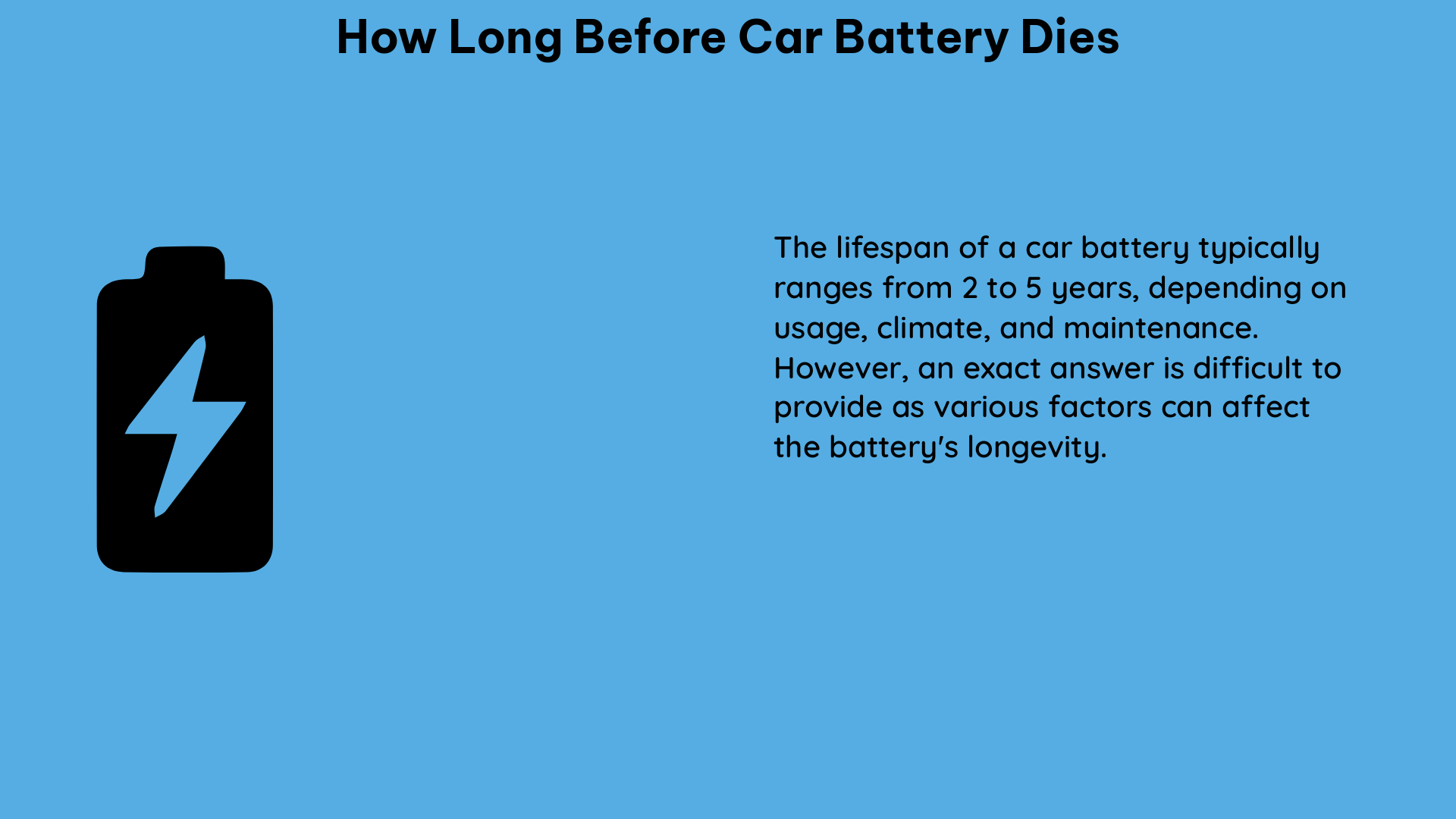The lifespan of a car battery can vary significantly depending on various factors, including the age and type of the battery, the vehicle, and the environmental conditions. Understanding these factors is crucial in determining how long a car battery can last without driving. This comprehensive guide will delve into the intricacies of car battery longevity, providing you with the knowledge to prolong the life of your battery and avoid unexpected breakdowns.
Factors Affecting Car Battery Lifespan
Battery Age and Type
The age and type of the car battery play a crucial role in determining its lifespan. On average, a well-maintained car battery can last between 2 to 5 years, with some high-quality batteries lasting up to 6 years. However, the battery’s lifespan can be significantly shorter if it’s an older model or a lower-quality battery.
The type of battery also matters. Conventional lead-acid batteries typically have a shorter lifespan compared to more advanced battery technologies, such as absorbent glass mat (AGM) or lithium-ion batteries. AGM batteries, for instance, can last up to 5 years or more with proper care and maintenance.
Vehicle Usage and Electrical Load
The way you use your vehicle can also impact the battery’s lifespan. Vehicles with higher electrical loads, such as those equipped with advanced infotainment systems, power-hungry accessories, or frequent use of high-drain features like air conditioning, will put more strain on the battery, leading to faster discharge.
Additionally, vehicles that are driven regularly and have the opportunity to recharge the battery through the alternator will generally have a longer battery lifespan compared to cars that sit idle for extended periods.
Environmental Factors
Environmental conditions can significantly affect a car battery’s performance and longevity. Extreme temperatures, both hot and cold, can accelerate the battery’s degradation.
In hot climates, the battery’s internal chemical reactions are accelerated, leading to faster self-discharge and a shorter overall lifespan. Conversely, in cold weather, the battery’s ability to hold a charge is reduced, making it more susceptible to premature failure.
Humidity and moisture can also contribute to battery corrosion, further reducing its lifespan.
Estimating Battery Lifespan Without Driving

Now that we’ve explored the key factors influencing car battery lifespan, let’s dive into the specifics of how long a battery can last without driving.
New Battery
A brand-new car battery, when left without driving, can typically last for 2 to 4 weeks before it fully discharges. This is due to the battery’s inherent self-discharge rate and the small amount of power consumed by the vehicle’s electronic systems, even when the car is turned off.
Well-Maintained Battery
A well-maintained car battery in good condition can last for 4 to 8 weeks without driving, depending on the vehicle’s electrical load and environmental factors. Regular maintenance, such as keeping the battery clean and ensuring proper connections, can help extend this timeframe.
Older Battery
As a car battery ages, its ability to hold a charge diminishes. An older battery, even if well-maintained, may only last for 2 to 4 weeks without driving before it becomes fully discharged.
Extreme Temperatures
Extreme temperatures, both hot and cold, can significantly reduce a car battery’s lifespan when left without driving. In hot climates, a battery may only last for 1 to 3 weeks, while in cold climates, it may only last for 1 to 2 weeks before becoming fully discharged.
Parasitic Drain
Parasitic drain, or the continuous draw of power from the battery even when the vehicle is turned off, can drastically reduce the battery’s lifespan. This can be caused by faulty electrical components, such as a malfunctioning alarm system or a loose connection in the wiring. In the presence of significant parasitic drain, a car battery may only last for a few days to a week without driving.
Maintaining and Storing Car Batteries
To extend the lifespan of your car battery and prevent premature failure, it’s essential to follow proper maintenance and storage practices.
Battery Maintenance
- Keep the battery terminals clean and free of corrosion by regularly cleaning them with a wire brush or baking soda and water solution.
- Ensure that the battery connections are tight and secure to prevent voltage drops.
- Consider using a battery maintainer or trickle charger to keep the battery charged when the vehicle is not in use.
- Avoid letting the battery become fully discharged, as this can lead to permanent damage.
Battery Storage
- If storing the car for an extended period, remove the battery and store it in a cool, dry place with a consistent temperature between 50°F and 70°F (10°C and 21°C).
- Ensure the battery is fully charged before storage and check it every 12 weeks, recharging it as needed.
- Avoid storing the battery in direct sunlight or in areas with high humidity, as these conditions can accelerate the battery’s degradation.
- When reinstalling the battery, check for any signs of damage or corrosion and replace the battery if necessary.
By understanding the factors that influence car battery lifespan and following best practices for maintenance and storage, you can significantly extend the life of your battery and avoid unexpected breakdowns, even when your car is not in use.
References:
- How Long Can a Car Sit Before the Battery Dies?
- How Long Does a Car Battery Last Without Driving?
- How Long Can a Car Sit Before the Battery Dies?
- Proven Techniques for Battery Drain Diagnosis

The lambdageeks.com Core SME Team is a group of experienced subject matter experts from diverse scientific and technical fields including Physics, Chemistry, Technology,Electronics & Electrical Engineering, Automotive, Mechanical Engineering. Our team collaborates to create high-quality, well-researched articles on a wide range of science and technology topics for the lambdageeks.com website.
All Our Senior SME are having more than 7 Years of experience in the respective fields . They are either Working Industry Professionals or assocaited With different Universities. Refer Our Authors Page to get to know About our Core SMEs.